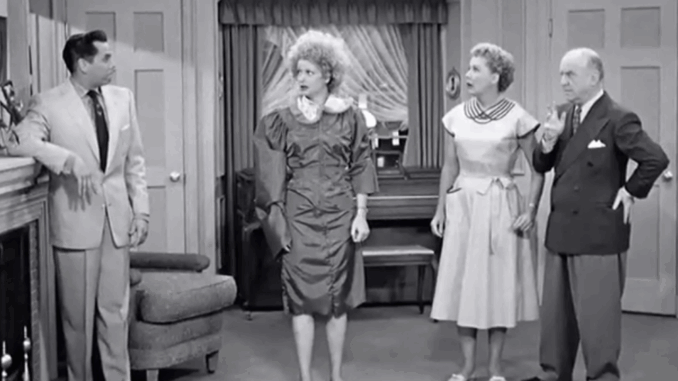
For generations, I Love Lucy has been the epitome of wholesome, family-friendly entertainment. The show’s timeless humor, iconic slapstick, and heartwarming portrayal of marriage and friendship have made it a cornerstone of television history. It’s the kind of show you can watch with your grandparents, a comforting dose of nostalgia in a chaotic world. But what if the laughter and lighthearted antics were a facade, masking a much darker, more tragic reality? A chilling fan theory, gaining traction decades after the show’s finale, posits that Lucy Ricardo was not just a zany housewife with big dreams; she was a woman trapped in a devastating cycle of mental illness and institutionalization.
This theory, which has been circulating in various forms online, suggests that the entire series is not a literal depiction of events, but a fragmented memory from a woman in a mental institution. The familiar characters—the long-suffering husband Ricky Ricardo, the bickering neighbors Fred and Ethel Mertz—are not real people but archetypes from Lucy’s past, figures she has constructed to make sense of her fractured reality. It’s a wildly dark take on a show that is anything but, and it forces a re-examination of some of the sitcom’s most iconic moments.
The Theory’s Key Pillars: Unraveling the ‘Laughter’
The core of this theory rests on a reinterpretation of key plot points and character traits.
1. The “Zany” Antics as Hallucinations: Lucy Ricardo’s entire character is built on her wild, often destructive, schemes to break into show business. The theory argues that these are not real events but elaborate fantasies. The episode where she stomps grapes in a vat, the one where she works in a chocolate factory, or the time she struggles with a television show: these are not genuine attempts at stardom but vivid hallucinations. The people she interacts with—Ricky, Fred, and Ethel—are just part of her elaborate dream world.
2. Ricky’s “Temper” as an Institutional Caregiver: In the show, Ricky is often exasperated by Lucy’s antics, but he always comes back to her with love and patience. The theory reinterprets this. Ricky is not her loving husband; he is a sympathetic caregiver or a psychiatrist. His attempts to “calm” her and his frustrated cries of “Lucy, you’ve got some ‘splainin’ to do!” are not marital spats but a doctor’s attempt to ground his patient in reality. His famous nightclub, the Tropicana, is a symbol of her desire for fame, a place of fantasy that he can only “visit” with her in her mind.
3. Fred and Ethel: Fellow Patients or Trapped Memory? Fred and Ethel Mertz are the show’s anchors, a source of stable, if grumpy, companionship. But what if they are not neighbors? The theory suggests they are fellow patients in the institution, people who are also part of Lucy’s constructed reality. Their constant bickering and their shared, often bizarre, moments with Lucy could be seen as shared symptoms of their own mental health struggles. The fact that they are always “there,” always part of her life, suggests they are a fixed part of her daily routine, people she sees every day in the institution.
4. The Move to Hollywood and Europe: The show’s famous move to Hollywood and later to Europe is seen as a sign of progress, a fulfillment of Ricky’s dream. But this theory posits a much darker explanation. These are not real journeys but a change in scenery within the institution. The “new people” they meet are new patients, and the change in environment is a desperate attempt by her caregivers to help her escape her own mind. The comedy of these episodes, the hilarious hijinks of their travels, is a sign of her mind trying to make sense of a new, unfamiliar world.
5. The Baby as a Psychological Manifestation: The birth of Little Ricky was a cultural phenomenon, a moment of pure joy for the show and its fans. But this theory takes a tragic turn. Little Ricky is not a real child but a psychological manifestation of a desire for a family that Lucy never had. The birth itself is not a moment of joy but a hallucination, a heartbreaking fantasy that provides her with the sense of purpose she is missing in her institutionalized life. It’s a way for her mind to cope with the loss and the trauma of her past.
The Dark Underbelly of the Sitcom
This theory, while a fan-created reimagining, is not without merit. It offers a new way of looking at a show that is often seen as simplistic and one-dimensional. It highlights the often-overlooked emotional complexity of the characters. Lucille Ball’s performance as Lucy was always about more than just physical comedy. There was a desperation in her eyes, a longing for something more than her mundane life. Her constant failures were not just punchlines; they were a testament to her unfulfilled dreams.
While the creators of I Love Lucy never intended for the show to have this dark undercurrent, the theory is a powerful testament to the show’s enduring legacy. It proves that even after all these years, fans are still so deeply invested in the characters and the world of the show that they are willing to create new narratives to make sense of them. It’s a reminder that great art, whether intended or not, is open to interpretation.
This theory is not meant to ruin your childhood memories of the show. Instead, it is meant to provoke thought and to offer a new perspective. It’s a way of looking at a beloved classic with a new set of eyes. It turns the laughter into a quiet cry for help, the friendship into a shared delusion, and the happy ending into a tragic, heartbreaking finale. It’s a theory that is as shocking as it is brilliant, and it proves that even after all these years, I Love Lucy is still a show that has something new to say about the human condition.